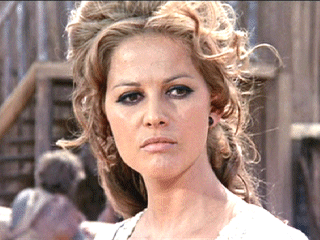 For this comment, I'd like you to pick one moment in Once Upon a Time in the West to comment on -- it could be a particular scene, a shot, whatever, and talk about what made it work or didn't work for you. I'll go first.
For this comment, I'd like you to pick one moment in Once Upon a Time in the West to comment on -- it could be a particular scene, a shot, whatever, and talk about what made it work or didn't work for you. I'll go first.Leone once said Clint Eastwood, who starred in three of his Westerns, had two acting styles: "Clint wearing a hat, and Clint without a hat." Point being, Leone films aren't the places to look for big "ACTING!" moments -- they tend to be subtle. One such subtle moment comes when Harmonica enters Jill's house after killing Frank. We pretty much know what's coming -- Cheyenne had told Jill that if Harmonica lived, he'd "come in, pack up his gear and say 'adios.'" Of course, that's exactly what happens, but there's one little detail as Harmonica fulfills Cheyenne's prophecy that makes him seem just a tad more vulnerable than he usually lets on. He lifts his gear off the wall with his left hand, but when he lowers it to carry it away, the pack suddenly drops downward, his shoulder jerks, and his head tilts downward. Then he turns and says, "Now I gotta go." Of course, the pack could just be really heavy, but in this instant I think we're seeing about as much emotion as we're going to get from Harmonica. At the risk of sounding too melodramatic, the pack isn't the only thing that's heavy -- it's his heart, too (sniff, sniff). He's acknowledging that although he can't stay (can you see him tending bar in Sweetwater?) there is a part of him that wants to stay with Jill. To me, that moment is worth fifty lines of dialogue.

